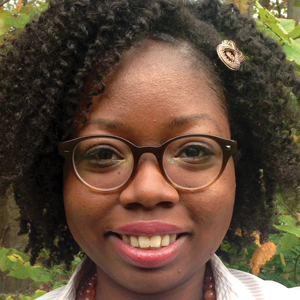Building your professional brand
Many of us are #workingathome and learning how to adapt to a new normal. This is a time for reflection. For some of us, it's also a time for making career pivots, exploring options and determining what we want out of our careers. For this week’s column, I am going to share how to use your uniqueness and skills to build your science professional brand.
What is your brand? You are the brand. It's simple? Right.

Many of you already know what your brands are but may not have really thought about using them as career tools. Your brand can open doors for you and help you find careers that suit you most.
If you are having trouble determining your brand, talk to someone who knows you well professionally (such as a mentor) and ask them these three questions:
1. What makes me stand out?
2. What is my career mission?
3. What are my key strengths?
Their responses will tell you if your brand is obvious. A great brand will shine through your work, speak for itself and be clear to others. For example, my brand is: science, education and communication. All of the work I do supports my brand; your work should support yours.
How to build a science professional brand
Build a portfolio: Your portfolio should represent you as a scientist. It is the visual representation of your brand and highlights your skills, includes samples of your work, shows your key interests and demonstrates what you bring to the table.
This doesn't have to be a decked-out fancy portfolio. It can be as simple as an aboutme page. Think of LinkedIn as the highlight reel of your portfolio.
Why build a portfolio? To showcase your talents.
Be authentically you: As scientists, we have many skills and identities. Some scientists feel like they have to hide their identities because they are not comfortable being themselves in a professional setting for fear of not being welcomed.
If you want to dance, be athletic or get red-carpet ready (i.e., #DontRushChallenge), you are still a scientist. Don't let other people diminish who you are or tell you are not a "real" scientist. Let's change the narrative by sharing our narratives.
Why be authentic? To humanize scientists and science.
Stay connected: If your schedule permits, join a virtual event to learn about career options and expectations and to see what scientists who work beyond the bench are doing. From there, you can start building connections that will help you grow professionally and build your brand.
If you are looking for ways to connect with other scientists, participate in ASBMB's monthly Twitter chats. This month, it's about COVID-19. In June, it'll be about doing science in the home.
Why stay connected? To build and maintain your network.
In addition, it is a good practice to spend time doing something that:
- Sparks your creativity: Find ways to use your science to engage with others. Start a blog or Instagram account or give a flash talk. Last week, ASBMB hosted a virtual flash talk competition. Flash talks are a great way to get your science out to the public. It is true power in the art of science communication, and it can be used to grow your brand. You can host your own flash talk or even recruit peers to do flash talks, too.
- Sparks your intellect: Sometimes, as scientists, we can get caught up in our own specialties. Find time to connect with scientists who are doing research you know nothing about or scientists who have a similar background but who work in a different environment. Gaining a variety of perspectives could be just what you need to point your career in a different direction.
- Sparks your curiosity: Explore the world of wonder around you. Think back to when you were a child and how you first got excited about science. Spark that enthusiasm again or foster the curiosity of a budding scientist.
Enjoy reading ASBMB Today?
Become a member to receive the print edition four times a year and the digital edition monthly.
Learn moreFeatured jobs
from the ASBMB career center
Get the latest from ASBMB Today
Enter your email address, and we’ll send you a weekly email with recent articles, interviews and more.
Latest in Careers
Careers highlights or most popular articles

Sketching, scribbling and scicomm
Graduate student Ari Paiz describes how her love of science and art blend to make her an effective science communicator.

Embrace your neurodivergence and flourish in college
This guide offers practical advice on setting yourself up for success — learn how to leverage campus resources, work with professors and embrace your strengths.

Upcoming opportunities
Apply for the ASBMB Interactive Mentoring Activities for Grantsmanship Enhancement grant writing workshop by April 15.

Quieting the static: Building inclusive STEM classrooms
Christin Monroe, an assistant professor of chemistry at Landmark College, offers practical tips to help educators make their classrooms more accessible to neurodivergent scientists.

Unraveling oncogenesis: What makes cancer tick?
Learn about the ASBMB 2025 symposium on oncogenic hubs: chromatin regulatory and transcriptional complexes in cancer.

Exploring lipid metabolism: A journey through time and innovation
Recent lipid metabolism research has unveiled critical insights into lipid–protein interactions, offering potential therapeutic targets for metabolic and neurodegenerative diseases. Check out the latest in lipid science at the ASBMB annual meeting.

